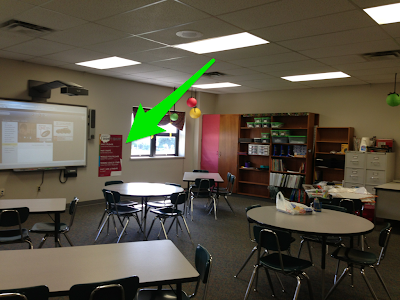I am so guilty of cutting off conversations and following up student explanations with my own.
"...learners can explain ideas in terms more accessible to students in the group, yet often we teachers feel we can explain things 'best.'" (Hoffer, p. 71) According to Hoffer, productive student discourse engages learners, promotes understanding, develops communication and collaboration skills, and supports academic language development. Hoffer also gives several examples of ways to create and sustain effective discourse. Questions stems are included to help us create an atmosphere of respect for thinking, ask learners to share their problem-solving processes, invite peers' comments and questions, take time to uncover errors, and let students revise their won thinking. I'm trying to think of a way I can keep all the great ideas at my fingertips. Or maybe, I'll commit to trying one question stem a day to help encourage discourse. I'm also thinking of making some type of card to attach to student tables to give them stems for explaining their own thinking. Those can be found on pages 76-77.
But....
"What do you do when a student says 'I don't now'?" is highlighted on page 79 of this chapter. I finally invested in this poster last summer and hung it in the room that I traveled to.
It was off in a corner, very high, and not at eye level. Ask me how many times I or a student referred to it....zero! This year, I've selected a different location...just to the right of my SMART board, at eye level. (Side Note: I can't wait to finish my classroom and share it with you!)
I have to believe, "as Dr. Carol Dweck, in the growth mindset, and much read 'IDK' as a teachable moment, an opportunity to reinforce my expectations that students can and will understand, not allow them to languish in the fixed mindset whey they believe they don't and can't get it" (Hoffer, p. 79). Hoofer also offers some other responses to 'IDK.'
Psychologist: "Well, if you did know, what you you think you might say?"
Zen: "We have plenty of time to wait until you are ready to share your thinking."
Who Wants to Be a Millionaire: "Would you like to phone a friend?"
Love and Logic: "We are really hopeful that you will share your ideas now, rather than need to come in at lunch and write a letter to the class about the topic."
I am thankful for these options as well as the poster to help me combat the 'I don't know' response that I know I will encounter at some point. I hope to use these as well as some of the scaffolding ideas provided in this chapter. Some of the structures presented for scaffolding discourse are:
Pair and Share: Students turn to a neighbor and briefly share their own thinking, then listen to the thinking of their partner.
Problem discussion: In a small groups, students work together to solve a problem.
Carousel discussion: In small groups, students either respond to written information or gather thinking about a topic by writing on a shared piece of paper; the paper is then passed on the next group.
Peer critique: One student comes to the board and presents her work or thinking about a certain problem to the whole class; peers observe and then respond with comments, questions, and comparisons.
With each of these, Hoffer suggest practicing the structure with a simple topic in order to set expectations, even role playing if needed, and then distinct feedback to encourage good behaviors and sway those behaviors that are unwanted. In addition to modeling, accountability is needed. We can hold students accountable by having them teach others, through observations, reporting out, and access (to privileges).
I think of the chapters I've read thus far, this one has been the most helpful...probably because it directly addresses an area of weakness for me. I hope to use the strategies, questions stems, and structures offered to promote effective student discourse in my classroom.
Want to read what other teachers think about this book?
Check out the book study link-up hosted by Sherrie @ Middle School Math Rocks!

.jpeg)



No comments:
Post a Comment